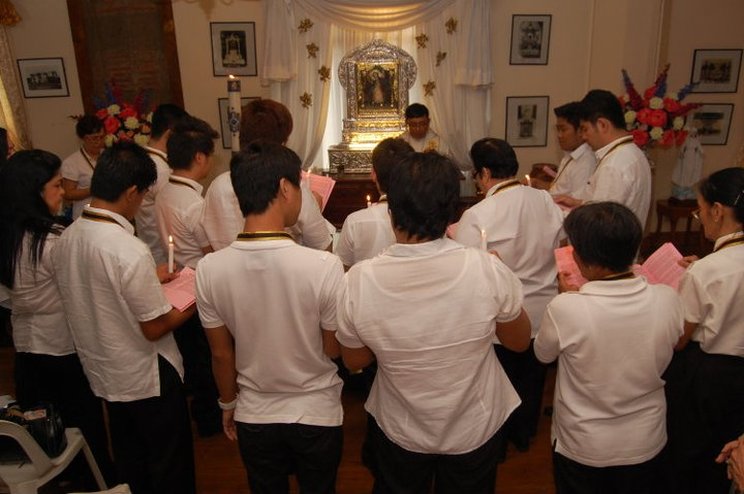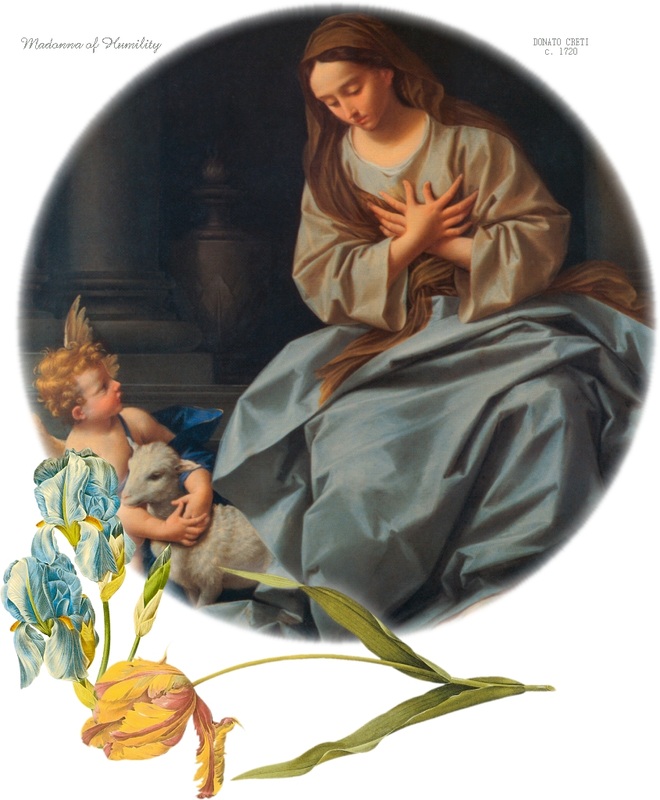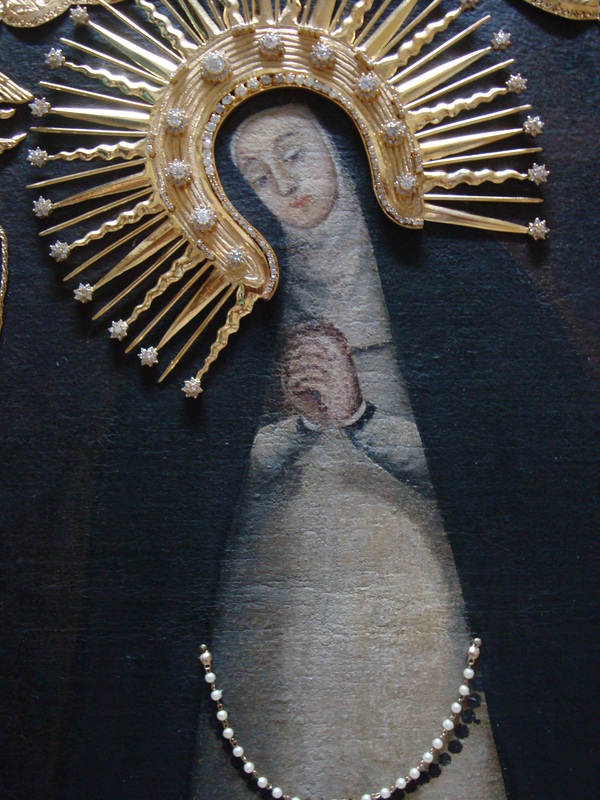The Importance of PRAYER.
MARY'S SPIRIT OF PRAYER
No other soul on earth ever practiced so perfectly as the Blessed Virgin the great lesson taught by our Savior that we must always pray, and not lose heart (Lk 18:1). No one can give us a better example, says Saint Bonaventure, of how necessary it is to persevere in prayer. Saint Albert the Great asserts that, after Jesus Christ, our Blessed Lady excelled all souls who ever existed or ever will exist in her spirit of prayer. Her prayer was continual and persevering. From the very first moment that she had the use of reason (which was, as we have said in the discourse on her Nativity, the first moment of her existence) she began to pray. So that she could devote herself still more to this pious practice, she retired into the solitude of the Temple when she was only three years old. There, as she revealed to Saint Elizabeth of Hungary, in addition to the other hours set aside for prayer she always rose at midnight and went before the altar to offer her petitions to God. Later in life (as we learn from Odilo), so as to meditate more fervently on the sufferings of Jesus, she frequently visited the places of Our Lord's nativity, passion, and burial. Moreover, she prayed with the most complete recollection of spirit, free from every distraction and inordinate affection. Nor did any exterior occupation ever interfere with the light of her unceasing contemplation, as Denis the Carthusian assures us.
Because of her love of prayer, Mary was so enamored of solitude that, as she told Saint Bridget, when she lived in the Temple she avoided association even with her own parents. Saint Jerome comments on the words of the prophet Isaiah: The virgin shall be with child and shall bear a son, and shall name him Emmanuel (Isa 7:14). He says that in Hebrew the word "virgin" properly means a "retired virgin." So we see that the prophet even foretold the love Mary would have for solitude. Richard of Saint Lawrence says that the angel addressed her in these words: The Lord is with you, because of her great love for seclusion. That is why Saint Vincent Ferrer maintains that Mary "left her house only to go to the Temple, and that when she did so her demeanor was modest and she kept her eyes cast down." For the same reason, when she went to visit Saint Elizabeth she went with haste.
This prompted Saint Ambrose to admonish virgins to avoid the world and public appearances as much as possible. Saint Bernard claims that it was Mary's love of prayer and solitude that prompted her " to avoid the society of men and useless conversation with them." The Holy Spirit called her a turtledove: Your cheeks are as beautiful as the turtledove's (Cant 1:9). According to Vergello, this is a reference to Mary's love of seclusion and her spirit of recollection. Turtledoves were known to seek solitude and to flee from association with other birds. Mary lived such a retired life in the world that the words of Canticles apply to her: Who is she that goes up by the desert, as a pillar of smoke? (Cant 3:6). Commenting on these words, the Abbot Rupert says: "You came up as from a desert, because you had a soul that loved solitude."
Philo assures us that "God only speaks to souls in solitude." Holy Writ says the same thing in the prophecy of Osee: I will lead her into the desert and speak to her heart (Osee 2:14). "Happy solitude!" exclaims Saint Jerome, "where God converses familiarly with his own." "Yes," says Saint Bernard, "solitude and silence force the soul to leave the thought of earth behind and to meditate on heavenly things."
Most holy Virgin, help us to love prayer and retirement, so that we may detach ourselves from the love of creatures and may aspire only to God and heaven where we hope one day to see you, to praise you, and to love you, together with Jesus, your son, for ever and ever. Amen.
Come over to me, all you that desire me, and be filled with my fruits (Ecclus 24:26). Mary's fruits are her virtues. "There has never been anyone like you, nor shall there ever be. You alone of all women, without any rival, have pleased the Lord."
THE SPIRIT OF PRAYER AND MEDITATION IN MARY
TAKEN FROM THE GLORIES OF MARY
by Saint Alphonsus Liguori
with Nihil Obstat and Imprimatur, 1931
There was never a soul on earth that practised in so perfect a manner as the Blessed Virgin the great lesson taught by our Saviour, that we ought always to pray, and not to faint. [Luke 18:1] From no one, says St. Bonaventure, can we better take example, and learn how necessary is perseverance in prayer,than from Mary: "Mary gave an example which we must know and not faint;" for Blessed Albert the Great asserts, that, after Jesus Christ, the Divine Mother was the most perfect in prayer of all who ever have been, or ever will be." Her prayer was continual and persevering. In the very first moment, in which she had the perfect use of reason, which was, as we have said in the discourse on her nativity, in the first moment of her existence, she began to pray. That she might be able to devote herself still more to prayer, when only three years of age she shut herself up in the retirement of the temple; where, amongst other hours set aside for this exercise, as she herself told St. Elizabeth of Hungary, "she always rose at midnight, and went before the altar of the temple to offer her supplications." For the same purpose, and that she might constantly meditate on the sufferings of Jesus, Odilo says, "she very frequently visited the places of our Lord's Nativity, Passion, and Sepulture." Moreover, she prayed with the greatest recollection of spirit, free from every distraction and inordinate affection, nor did any exterior occupation ever obscure the light of her unceasing contemplation, as we are assured by Denis the Carthusian.
Through love for prayer, the Blessed Virgin was so enamoured of solitude, that, as she told St. Bridget, when she lived in the temple she avoided even intercourse with her parents. On the words of the prophet, Isaias, Behold a Virgin shall conceive and bear a Son, and His name shall be called Emmanuel. [7:14] St. Jerome remarks, that the word virgin, in Hebrew, properly signifies a retired virgin; so that even the prophet foretold the affection which Mary would have for solitude. Richard of St. Laurence says that the Angel addressed her in these words, The Lord is with thee, on account of her great love for retirement. For this reason St. Vincent Ferrer asserts that the Divine Mother "only left her house to go to the temple, and then her demeanor was all composed, and she kept her eyes modestly cast down." For the same reason, when she went to visit St. Elizabeth, she went with haste. [Luke 1:39] From this, St. Ambrose says, "that virgins should learn to avoid the world."
St. Bernard affirms that on account of Mary's love for prayer and solitude, "she was always careful to avoid the society and converse of men." She was therefore called a turtle-dove by the Holy Ghost: Thy cheeks are beautiful as the turtle-dove's. [Cant. 1:9] "The turtle-dove," says Vergello, "is a solitary bird, and denotes unitive affection in the soul." Hence it was that the Blessed Virgin always lived solitary in this world as in a desert, and that of her it was said, Who is she that goeth up by the desert, as a pillar of smoke? [Cant. 3:6] On these words the Abbot Rupert says, "Thus didst thou, indeed, loving solitude, ascend by the desert."
Philo assures us that "God only speaks to souls in solitude." God Himself declares the same thing by the prophet Osee: I will lead her into the wilderness, and I will speak to her heart. [2:14] "O happy solitude!" exclaims St. Jerome, "in which God speaks familiarly and converses with His Own." "Yes," says St. Bernard, "for solitude, and the silence which is there enjoyed, force the soul to leave the earth in thought, and meditate on things of Heaven."
Most holy Virgin, do thou obtain us affection for prayer and retirement, that, detaching ourselves from the love of creatures, we may aspire only after God and Heaven, where we hope one day to see thee, to praise thee, and to love thee, together with Jesus, thy Son, for ever and ever. Amen.
Come over to me, all ye that desire me, and be filled with my fruits.[Ecclus. 24:26] Mary's fruits are her virtues. "Thou hast had none like thee, nor shalt thou have an equal. Thou alone of women hast above all pleased Christ."
The title "Our Lady of Solitude" is a constant reminder that Mary could not have attained that most distinctive of all Christian vocations, Hearer of the Word, without silence.
"Only the silent hear and those who do not remain silent do not hear."--Pieper
Our Lady of Solitude and Contemplation, teach us to reach out to the Father in the spirit of prayer and service in our families and our communities and to all humankind through Holy Mother Church.
Teach us to pray from our depths where you are, Trinity Indwelling! In pure faith, pure hope, and pure love, dearest Mother, help us to become more and more like you in humility and obedience to God’s Divine Plan through the faithful daily living of the teachings of our Holy Mother Church.
Teach us to pray from our depths where you are, Trinity Indwelling! In pure faith, pure hope, and pure love, dearest Mother, help us to become more and more like you in humility and obedience to God’s Divine Plan through the faithful daily living of the teachings of our Holy Mother Church.



